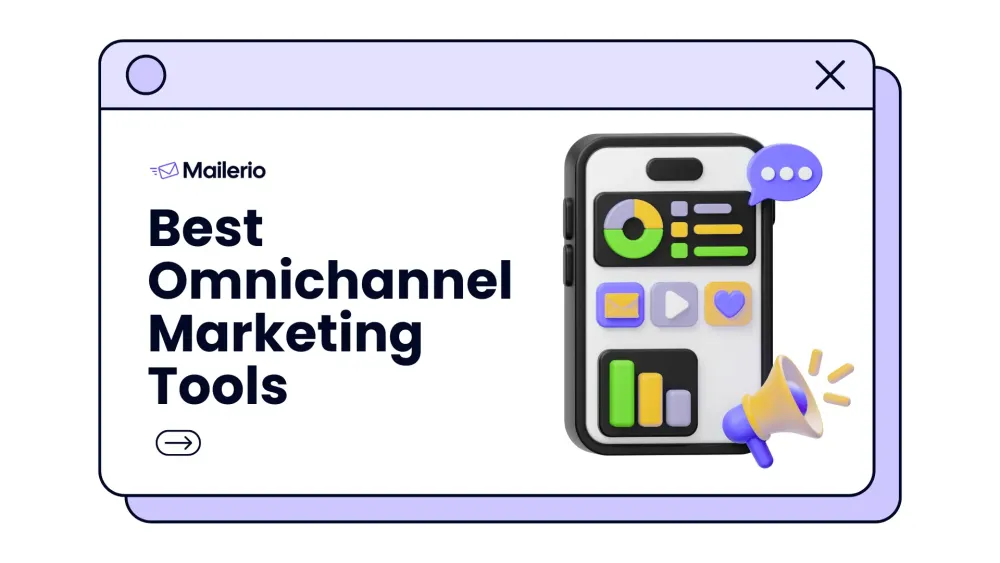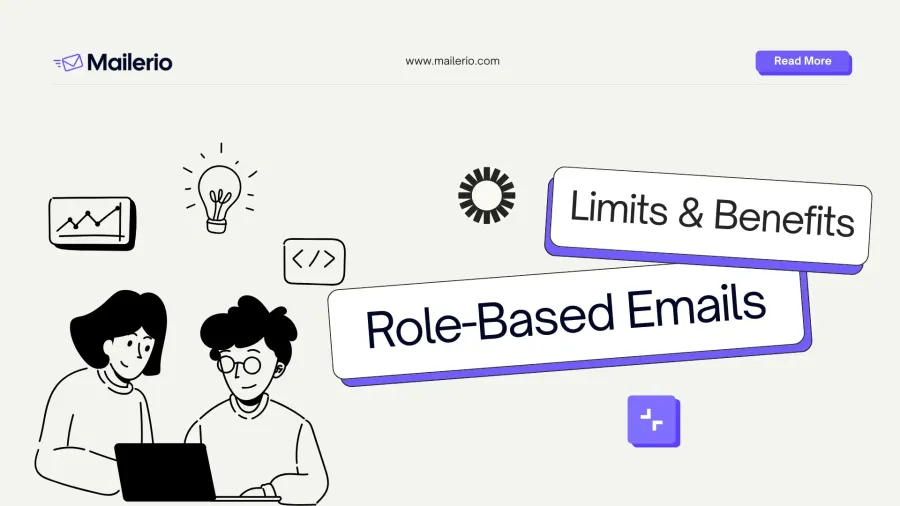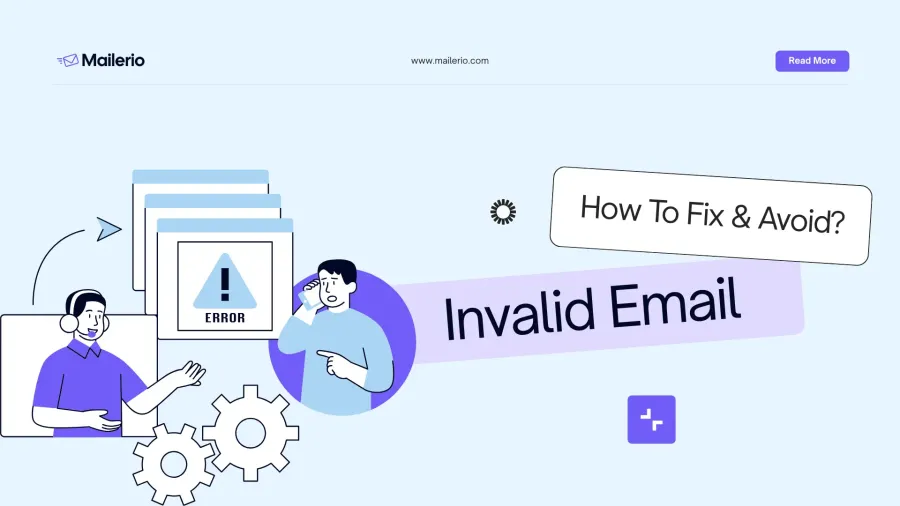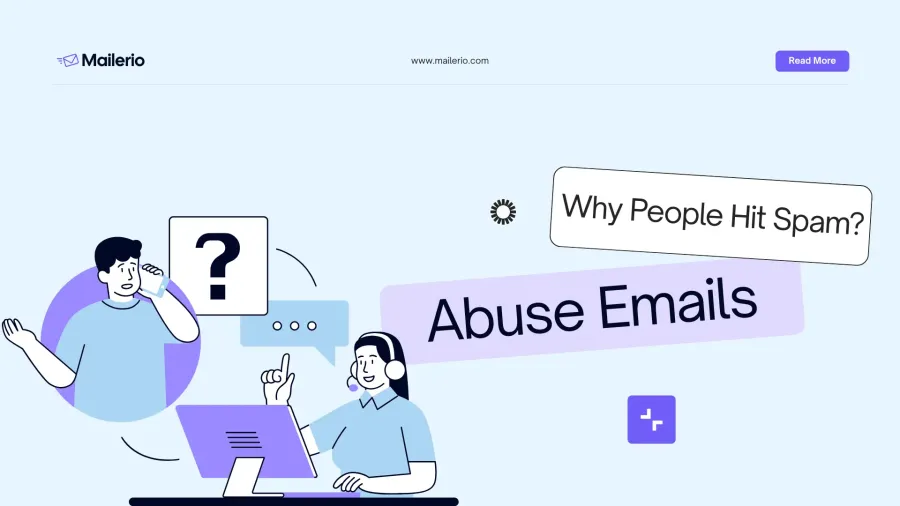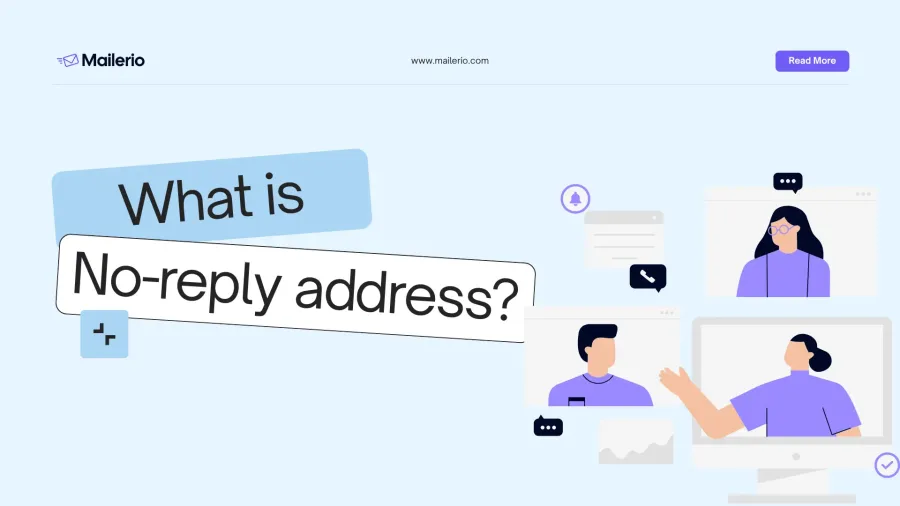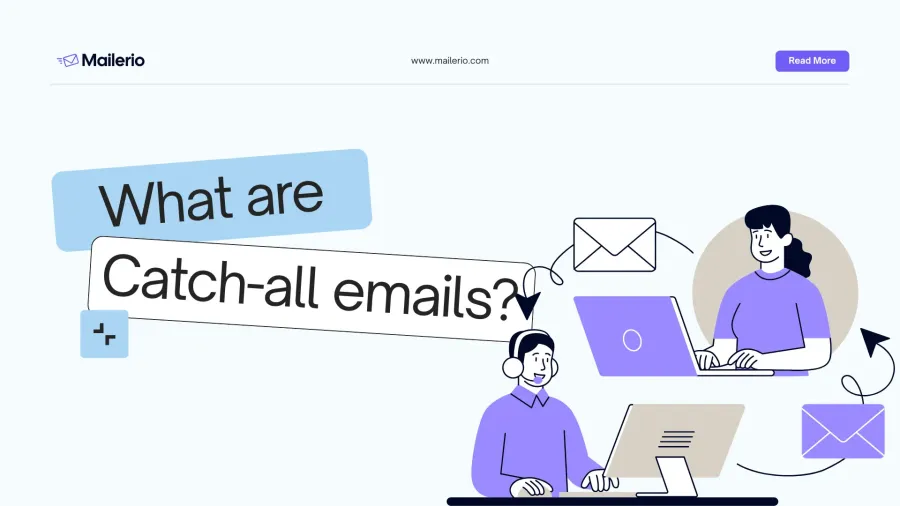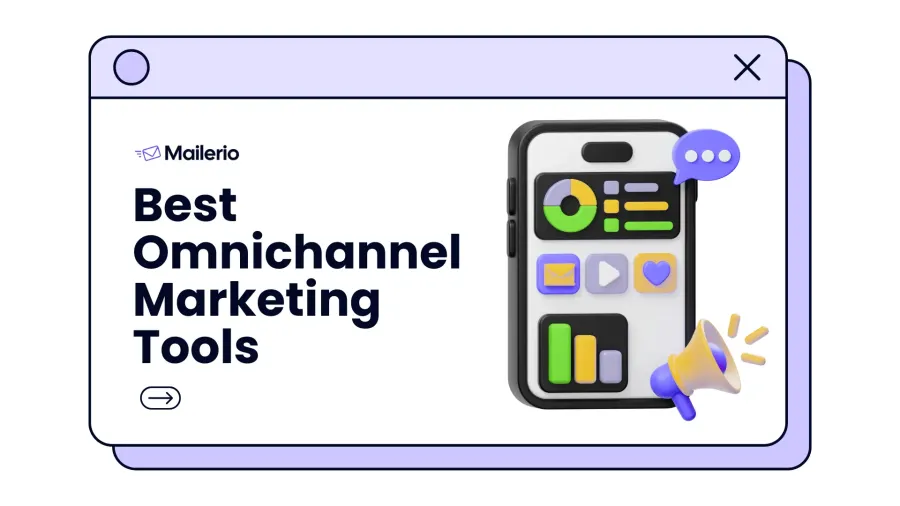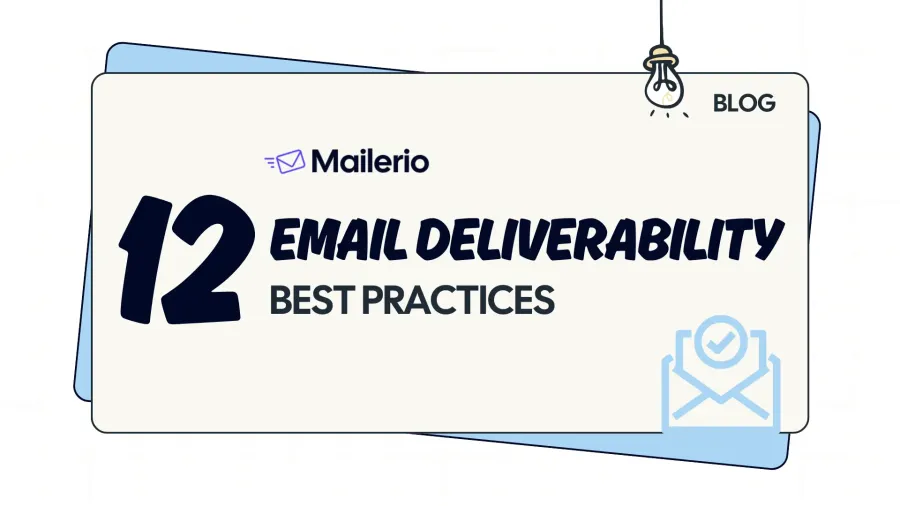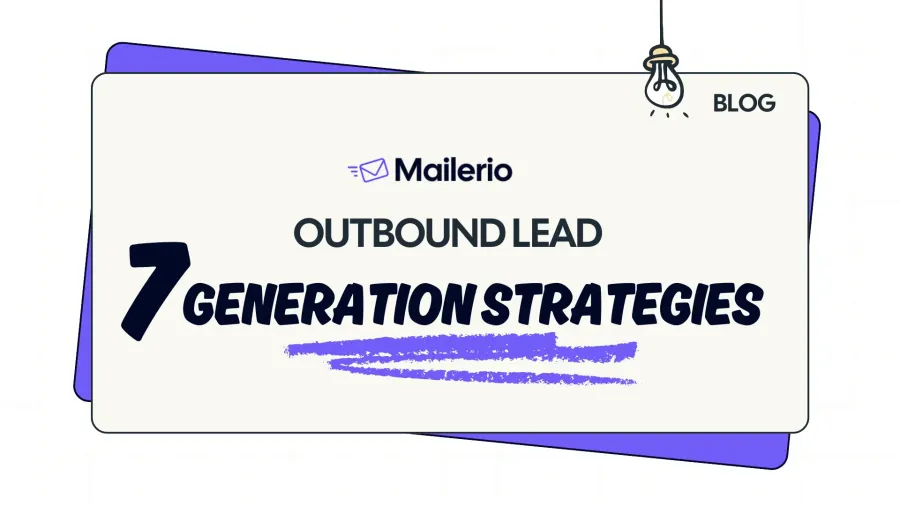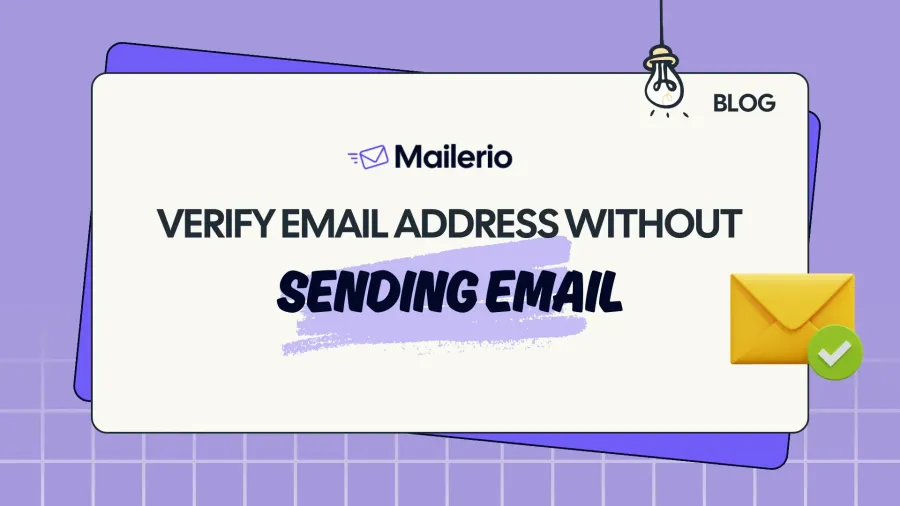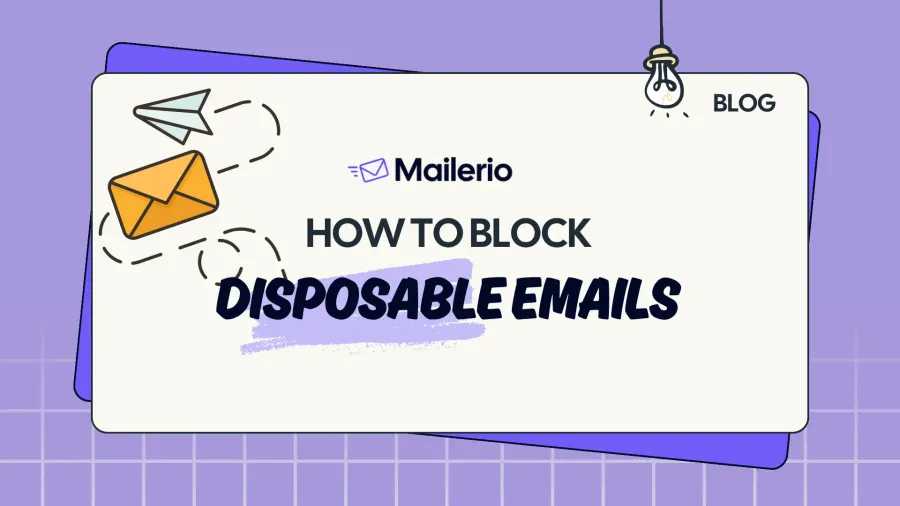In a world where customer interactions span countless channels, delivering a consistent experience can be daunting. The challenge? Disjointed communications that frustrate customers and dilute brand impact. Enter the best tools for omnichannel marketing. These platforms, like Hubspot or Mailerio, unify your strategy, ensuring seamless engagement from email to social media.
Table of Contents:
- What Is Omnichannel Marketing?
- Why Omnichannel Marketing Matters
- Key Features to Look for in Omnichannel Tools
- Comparison Table: Top Omnichannel Marketing Tools
- 12 Best Omnichannel Marketing Tools
- Honorable Mentions & Emerging Solutions
- Why Deliverability & List Hygiene Matter (and How Mailerio Helps)
- How to Choose and Integrate Your Omnichannel Stack
- Quick-Start Checklist for Omnichannel Readiness
- User Stories: Success with Omnichannel + Mailerio
- Expert Tips for Omnichannel Success
- FAQs
- Conclusion
This guide unpacks top tools designed to weave your customer interactions into a cohesive journey, driving loyalty and growth. Dive in to transform your approach and keep up with ever-evolving expectations.
TL;DR
Facing challenges in unifying customer interactions? Omnichannel marketing tools such as Mailerio, Shopify, HubSpot, Omnisend, and Klaviyo ensure seamless communication across email, social media, and SMS. For 2025, optimize engagement and boost ROI with platforms that integrate customer journeys. Key strategies include maintaining list hygiene, leveraging data for personalization, and choosing tools that integrate with your existing systems. Ready to enhance customer engagement? This guide has you covered.
What Is Omnichannel Marketing?
Omnichannel marketing is creating a cohesive customer experience across various channels. These channels can include email, SMS, social media, web, and even in-store interactions. Unlike traditional marketing strategies that keep these channels separate, omnichannel marketing integrates them into a seamless journey.
Omnichannel vs. Multichannel
It’s easy to confuse omnichannel with multichannel marketing, but there’s a crucial difference. Multichannel marketing utilizes multiple channels to reach customers, but these channels often operate independently of one another. Omnichannel marketing connects these channels, providing a unified experience. Take a look at the visual below to see the differences in how these channels work.

This distinction matters for growth. Integrated campaigns across multiple channels often outperform single-channel efforts, doubling campaign ROI and boosting retention.
Author’s note: Based on recent research, customer satisfaction plays a crucial mediating role between omnichannel integration and customer loyalty. The study concluded that among all dimensions, synchronization, real-time, integrated interactions are the most critical, shaping how customers perceive their experience. While omnichannel efforts may not directly drive loyalty, they strongly influence it through satisfaction, emphasizing the importance of aligning business strategies with customer expectations (Analysing the Effectiveness of Omnichannel Marketing Strategies on Customer Experience in Jordan, Journal of Ecohumanism, 3(7), 2024, DOI:10.62754).
Typical Omnichannel Use Cases
SaaS Founders: For SaaS companies, omnichannel platform marketing can streamline the onboarding process. By using email and in-app messaging, founders can guide users through setup and feature adoption seamlessly.
E-commerce: In the e-commerce sector, omnichannel software enhances customer shopping experiences. Whether users browse online, receive personalized offers via SMS, or shop in-store, the journey remains consistent and personalized.
B2B: For B2B marketing, omnichannel strategies nurture leads. Integrating various touchpoints like webinars, email campaigns, and social media interactions ensures a cohesive engagement and higher conversion rates.
Take, as an example, this onboarding flow for B2B customers. The funnel consists of four phases: convert, activate, retain, and expand. You can see that the onboarding flow is created using software omnichannel marketing methods, such as welcome video, best practice docs, webinar invite, re-engagement email, training, cross-sell webinar, and tooltip tour.

Adopting an omnichannel approach can transform how your business interacts with the audience, leading to significant growth and improved customer loyalty.
Why Omnichannel Marketing Matters
Consumers interact with brands across multiple touchpoints, with nearly three-quarters (73%) using more than one channel to complete a purchase. Research by Moengage shows that customers who engage through an omnichannel experience not only spend around 30% more but are also more likely to develop long-term loyalty. There are four main reasons why omnichannel marketing is important:
- Connecting the customer journey
- Fluid communication expectations
- Data-driven personalization
- Compliance and data privacy shifts
Let’s take a look at each benefit more closely.
Connecting the Customer Journey
Customers expect a unified experience across multiple channels, whether they’re engaging via email, SMS, chat, social media, support, or push notifications. Omni channel marketing platform ties these interactions together, enhancing the customer journey from discovery to purchase and beyond.
Fluid Communication Expectations
Customers demand seamless communication. An effective omnichannel communication platform allows businesses to interact with users fluidly, meeting expectations for real-time support and personalized interactions. Validating emails with Mailerio helps maintain this fluidity by ensuring your messages are delivered to active, receptive inboxes.
Data-Driven Personalization
Omnichannel strategies leverage data to personalize and engage audiences more effectively. By analyzing behavior across channels, businesses can tailor their messaging to individual preferences, resulting in higher conversion rates and customer satisfaction.
Compliance and Data Privacy Shifts
As data privacy regulations evolve, companies must adapt their omnichannel strategies to remain compliant. Respecting user privacy while delivering personalized experiences is a delicate balance, but essential for building trust and avoiding penalties.
Key Features to Look for in Omnichannel Marketing Platforms
Choosing the right omnichannel marketing platform can make or break your marketing strategy. Here’s what to look for:
Unified Dashboard for Channel Orchestration
Having a single dashboard to coordinate all channels is essential. It lets you seamlessly manage and optimize every customer interaction, ensuring consistency and efficiency across platforms.
Automation and Workflow Triggers
Omnichannel automation should include workflow triggers that react to customer actions. This feature saves time and enhances personalization by delivering the right message at the right moment without manual intervention.
Data Sync & Real-Time Reporting
Real-time data synchronization and reporting are critical. They provide insights into customer behavior and campaign performance, allowing you to make informed decisions quickly. This is essential for adapting strategies on the fly.
Integrations
The best tools integrate effortlessly with CRM systems, e-commerce platforms, and APIs. They should also include integrations with services like Mailerio for list cleaning. Keeping your email lists clean ensures better engagement and reduces spam risks.
Deliverability and Sender Reputation Safeguards
Effective list validation is crucial for protecting your sender reputation. It can reduce bounce rates from the typical 5-10% to less than 2%, significantly boosting deliverability, as noted by Demand Experts).
Focusing on these features ensures your omnichannel strategy is robust, efficient, and ready to drive growth.
Comparison Table: Top Omnichannel Marketing Tools
| Tool | Best For | Main Channels | Automation | CRM | Pricing | Mailerio Compatible | Notable Feature |
|---|---|---|---|---|---|---|---|
| Shopify | Omnichannel eCommerce platform | Email/SMS/Web | Yes | Yes | $$ | Yes | Storefront + POS |
| HubSpot | All-in-one marketing | Email/Web/Social | Yes | Yes | $$$ | Yes | Deep CRM/automation |
| Omnisend | Ecommerce automation | Email/SMS/Push | Yes | Basic | $$ | Yes | Prebuilt workflows |
| Klaviyo | Advanced segmentation | Email/SMS | Yes | Basic | $$ | Yes | Powerful analytics |
| Zendesk | Customer support | Chat/Email/Social | Yes | Yes | $$ | Yes | Multichannel support |
| ActiveCampaign | SMBs automation | Email/SMS/Web | Yes | Yes | $-$$ | Yes | Dynamic content |
| Brevo | SMB/email automation | Email/SMS/Web | Yes | Yes | $-$$ | Yes | Transactional emails |
| GetResponse | Marketing automation | Email/Webinar/SMS | Yes | Yes | $-$$ | Yes | Webinar marketing |
| Freshmarketer | CRM & support | Email/Chat/Web | Yes | Yes | $$ | Yes | Built-in CRM |
| Tidio | Live chat & chatbots | Chat/Email | Yes | Basic | $-$$ | Yes | AI-powered chat |
| JivoChat | Support & engagement | Chat/Call | Limited | Yes | $ | Yes | Multichannel inbox |
| Mailerio | List hygiene & validation | Yes | API | $ | – | Advanced validation |
This table highlights top tools tailored for omnichannel marketing. Each tool excels in unique areas, whether it s deep CRM capabilities, powerful analytics, or seamless support integration. Explore these options based on your specific business needs and gain the benefits of a well-integrated marketing strategy.
12 Best Omnichannel Marketing Tools
1. Mailerio
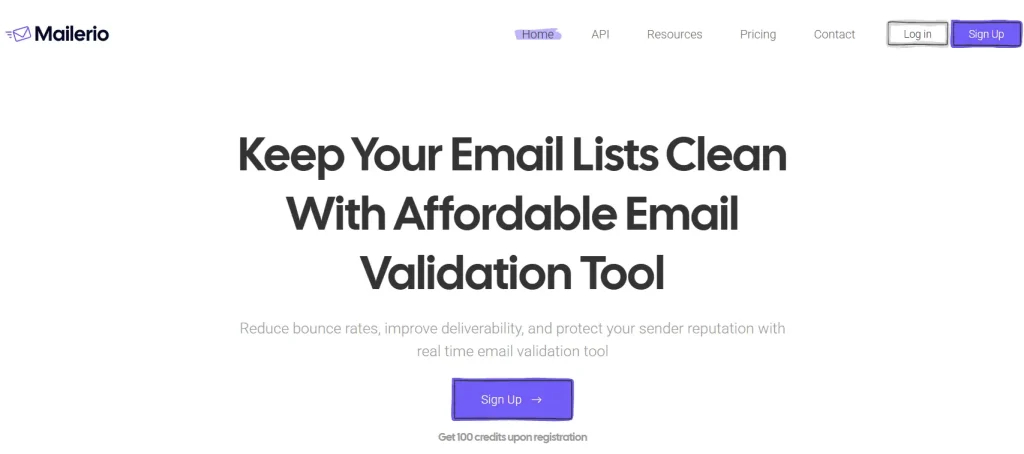
Mailerio offers a powerful email validation tool to ensure deliverability and enhance the effectiveness of your email marketing strategy.
Main Features:
- Email Validation: Verify email addresses in real time to reduce bounce rates and improve sender reputation.
- Bulk Verification: Process large lists efficiently to maintain clean and reliable email databases.
- API Integration: Seamlessly integrate with your existing platforms for automated email verification.
- Detailed Reports: Gain insights into validation results to help refine email strategies.
Pros:
- Ensures high email deliverability rates by reducing invalid email addresses.
- Easy integration with popular marketing platforms.
- User-friendly interface for managing and validating large lists.
Cons:
- Focused specifically on email validation; additional marketing features are not included.
- May require additional tools for broader marketing needs.
Pricing:
- Flexible pricing plans based on the number of verifications required.
- Start verifying small lists as low as $7 for 1000 emails. Check detailed pricing here.
Who Is Mailerio Suited For?
Mailerio is perfect for businesses that rely heavily on email marketing and need to maintain high deliverability rates. It’s particularly beneficial for those looking to clean their email lists and ensure their marketing efforts reach the right audience.
2. Shopify
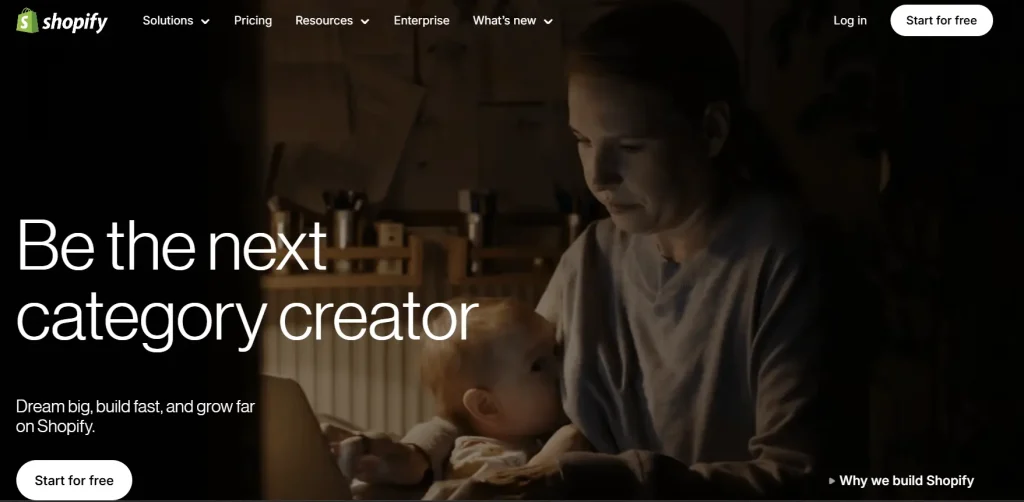
Shopify is a leading e-commerce platform that supports businesses in creating and managing online stores. Its omnichannel capabilities allow you to streamline customer interactions across various touchpoints.
Main Features:
- Multi-Channel Selling: Integrates with Amazon, eBay, social media, and more.
- Customer Management: Offers built-in CRM tools for effective customer tracking.
- Marketing Automation: Automates email campaigns and personalized marketing.
- Comprehensive Analytics: Provides detailed insights into sales and customer behavior.
Pros:
- Easy to set up and use, even for beginners.
- Extensive app ecosystem to enhance functionality.
- Robust support and community resources.
Cons:
- Transaction fees unless using Shopify Payments.
- Limited customization with lower-tier plans.
Pricing:
- Basic plans start at $27 per month.
- Advanced features available in higher-tier plans.
Who Is Shopify Suited For? Shopify is ideal for small to medium-sized businesses seeking to establish or enhance their online presence. It’s particularly beneficial for retailers looking to integrate online and offline sales channels seamlessly.
3. HubSpot
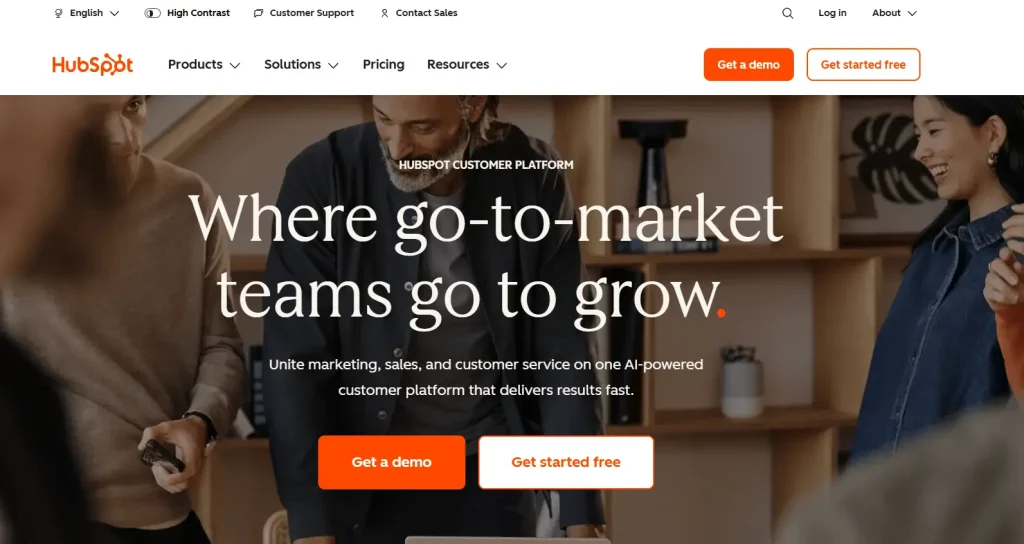
HubSpot is a comprehensive inbound marketing, sales, and service platform designed to help businesses grow through robust omnichannel strategies.
Main Features:
- CRM and Sales Tools: Manage customer relationships and automate sales processes.
- Marketing Hub: Includes email marketing, landing pages, and social media management.
- Customer Service Hub: Offers ticketing and helpdesk features for seamless support.
- Analytics and Reporting: Provides detailed insights into campaign performance and customer behavior.
Pros:
- Intuitive interface with extensive training resources.
- A robust ecosystem that integrates with numerous third-party apps.
- Free tier available with essential features.
Cons:
- Can become costly as you add premium features.
- Some users may find the setup process complex.
Pricing:
- Free tier available with basic features.
- Paid plans for more advanced tools start at $9 per seat/month. But it really depends on your needs and size of the business.
Who Is HubSpot Suited For? HubSpot is suitable for businesses of all sizes looking to implement cohesive marketing, sales, and service strategies. It’s particularly effective for companies that prioritize automation and detailed customer insights.
4. Omnisend
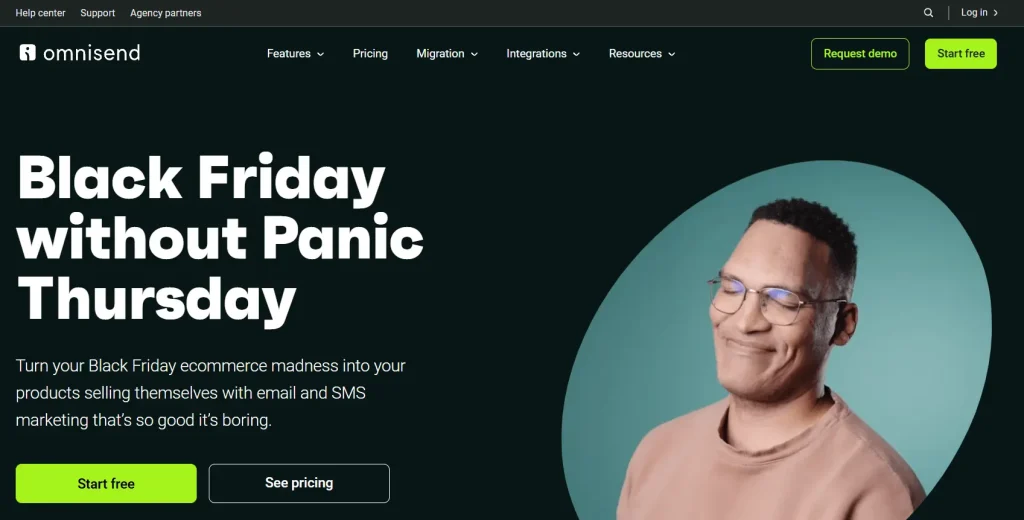
Omnisend is designed to streamline your e-commerce marketing efforts with its powerful omnichannel capabilities, helping businesses engage customers across multiple platforms.
Main Features:
- Email & SMS Marketing: Customize campaigns and automate workflows to connect with your audience effectively.
- Seamless Integrations: Easily connects with popular e-commerce platforms like Shopify, BigCommerce, and WooCommerce.
- Audience Segmentation: Target specific customer groups with personalized messaging.
- Push Notifications: Engage users with browser-based notifications for promotions and updates.
Pros:
- User-friendly interface with drag-and-drop editing.
- Strong focus on e-commerce, offering tailored solutions for online retailers.
- Effective automation features enhance campaign efficiency.
Cons:
- Limited customization for email templates compared to some competitors.
- Advanced features might require a learning curve for new users.
Pricing:
- Free plan available for smaller operations, focusing on basic email marketing.
- Paid plans start at $16 per month, scaling with features and list size. Details are available on their pricing page here.
Who Is Omnisend Suited For?
Omnisend is ideal for e-commerce businesses seeking to unify their marketing efforts across channels. It’s particularly beneficial for those looking to boost customer engagement with seamless emails, SMS, and push notifications.
5. Klaviyo
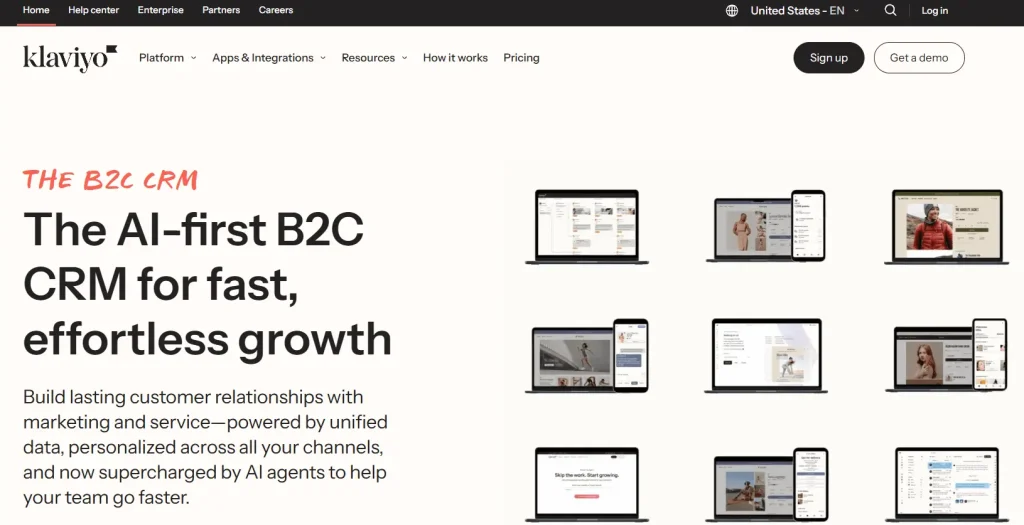
Klaviyo focuses on empowering e-commerce brands with advanced omnichannel marketing features, offering a data-driven approach to customer engagement.
Main Features:
- Email & SMS Marketing: Deliver personalized messages based on customer behavior and preferences.
- Customer Data Platform: Leverage comprehensive data insights to tailor marketing strategies.
- Customizable Automations: Build complex automation workflows using customer data.
- Integration Capabilities: Seamlessly integrates with platforms like Shopify, Magento, and Salesforce.
Pros:
- Highly customizable and data-focused, perfect for targeted marketing.
- Strong emphasis on automation for enhanced operational efficiency.
- Detailed analytics for performance tracking and strategy refinement.
Cons:
- Pricing can increase with a growing contact list.
- Some users may find the learning curve steep, particularly with complex features.
Pricing:
- Offers a free plan for up to 500 email sends.
- Pricing plans start at $45 per month, with scaling based on contact volume and features. Full pricing details are available here.
Who Is Klaviyo Suited For?
Klaviyo is well-suited for e-commerce brands aiming to harness the power of data for personalized marketing. Ideal for businesses seeking detailed analytics and robust automation, helping to cultivate deeper customer relationships.
6. Zendesk
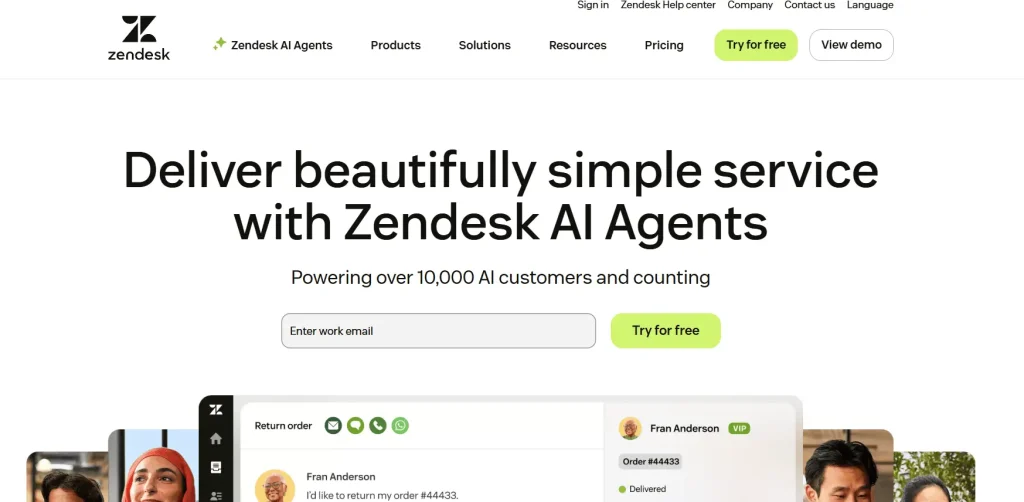
Zendesk is a comprehensive platform designed to enhance customer service and support through effective omnichannel communication.
Main Features:
- Support Ticketing System: Efficiently manage customer inquiries and issues.
- Live Chat and Messaging: Engage customers in real time across multiple channels.
- Help Center and Community Forums: Empower customers with self-service resources and community interactions.
- Analytics and Reporting: Gain insights into support performance and customer satisfaction.
Pros:
- User-friendly interface with customizable workflows.
- Extensive integration options with CRM and other applications.
- Scalable solutions catering to both small businesses and large enterprises.
Cons:
- Pricing can escalate with additional features and users.
- Initial setup may be complex for some users.
Pricing:
- Offers a free trial for new users.
- Paid plans start at $25 per agent/month, varying with advanced features and support needs. Explore full pricing details here.
Who Is Zendesk Suited For?
Zendesk is ideal for businesses focused on enhancing customer support and engagement across channels. It’s particularly suited for companies needing scalable solutions to manage growing customer service demands efficiently.
7. ActiveCampaign
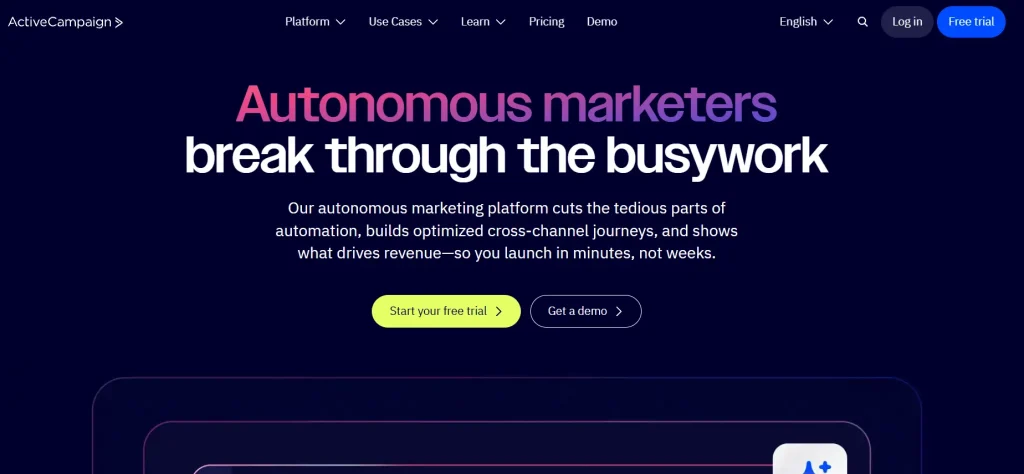
ActiveCampaign combines email marketing, automation, and CRM tools to boost customer engagement with an omnichannel approach.
Main Features:
- Email Marketing Automation: Create personalized email campaigns with advanced automation sequences.
- CRM Integration: Manage and develop customer relationships directly within the platform.
- Multichannel Automation: Connect with customers via email, SMS, and social media.
- Advanced Segmentation: Target specific audiences based on behavior and preferences.
Pros:
- Robust automation features that enhance marketing efficiency.
- User-friendly interface with comprehensive templates and customization options.
- High scalability suitable for both small businesses and larger enterprises.
Cons:
- Pricing increases with additional features and contact growth.
- Some users may require time to fully utilize complex automation capabilities.
Pricing:
- Free trial available for new users.
- Paid plans start at $15 per month (billed annually), scaling with the number of contacts and features required. Complete pricing information is available here.
Who Is ActiveCampaign Suited For?
ActiveCampaign is perfect for businesses seeking to integrate email marketing, automation, and CRM into a cohesive strategy. It’s ideal for those prioritizing advanced automation and personalized customer journeys across multiple channels.
8. Brevo (Sendinblue)
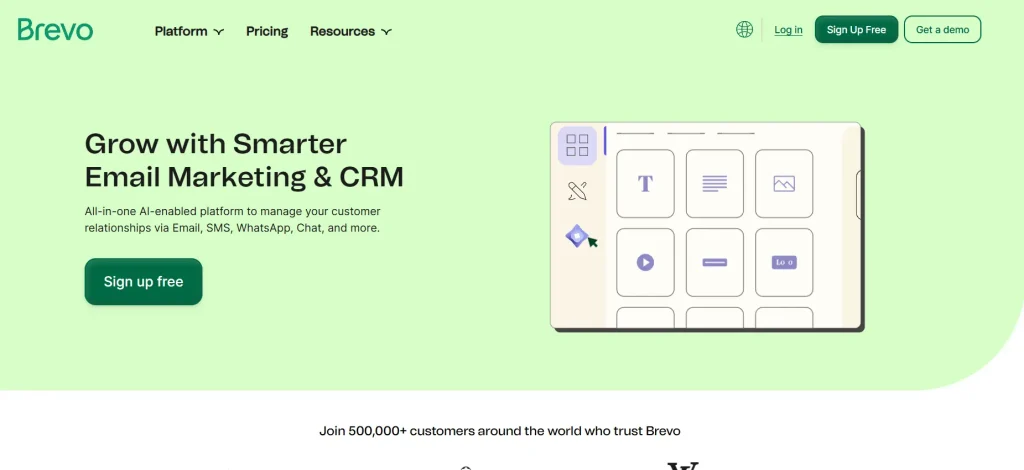
Brevo, formerly known as Sendinblue, is a versatile platform that caters to a wide range of marketing needs with its strong focus on omnichannel communication.
Main Features:
- Email and SMS Marketing: Design personalized campaigns with ease.
- Marketing Automation: Automate workflows to engage customers more effectively.
- CRM System: Manage customer relationships seamlessly within the platform.
- Chat and Inbox Features: Provide real-time support and interaction with customers.
Pros:
- Intuitive interface with a drag-and-drop editor for easy use.
- Cost-effective solutions catering to small and medium-sized businesses.
- Diverse range of features beyond just email marketing.
Cons:
- Some advanced features might not be as robust as specialized tools.
- Reporting capabilities could be more detailed for in-depth analysis.
Pricing:
- Free plan available with essential features for up to 300 emails per day.
- Paid plans start at $7 per month, varying with the number of emails and advanced functionalities. Detailed pricing options can be found here.
Who Is Brevo Suited For?
Brevo is ideal for small to medium-sized businesses looking for an all-in-one marketing solution. It’s particularly suited for those wanting to integrate email, SMS, and CRM into their marketing strategy efficiently.
9. GetResponse
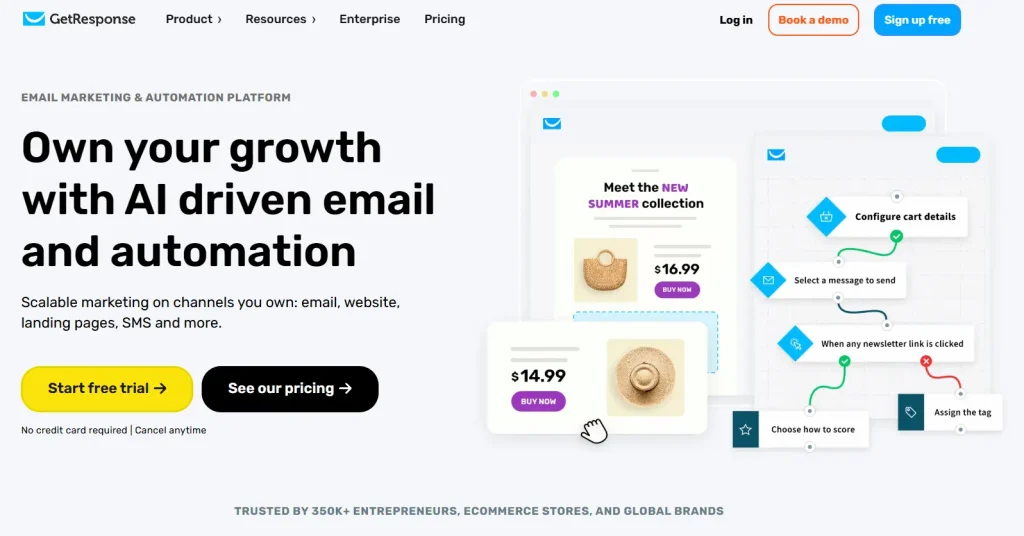
GetResponse is a comprehensive marketing platform that enhances customer interaction through its robust omnichannel capabilities.
Main Features:
- Email Marketing: Craft targeted email campaigns with customizable templates.
- Marketing Automation: Develop complex workflows to nurture leads and grow business.
- Webinars: Host online webinars to engage and educate your audience.
- E-commerce Tools: Enhance online sales with conversion-optimized tools.
Pros:
- Versatile toolset catering to a wide range of marketing activities.
- Strong emphasis on automation and lead nurturing.
- Offers unique features like webinars for broader engagement.
Cons:
- Interface may be overwhelming for new users.
- Advanced features could require time and training to master.
Pricing:
- A free trial is available for 14 days, including premium features.
- Paid plans start at $16 per month, adjusting based on contact list size and additional features. Explore full pricing options here.
Who Is GetResponse Suited For?
GetResponse is perfect for businesses searching for an all-inclusive marketing platform that offers email, automation, and webinars. It’s particularly beneficial for those looking to integrate diverse marketing strategies in a single platform.
10. Freshmarketer
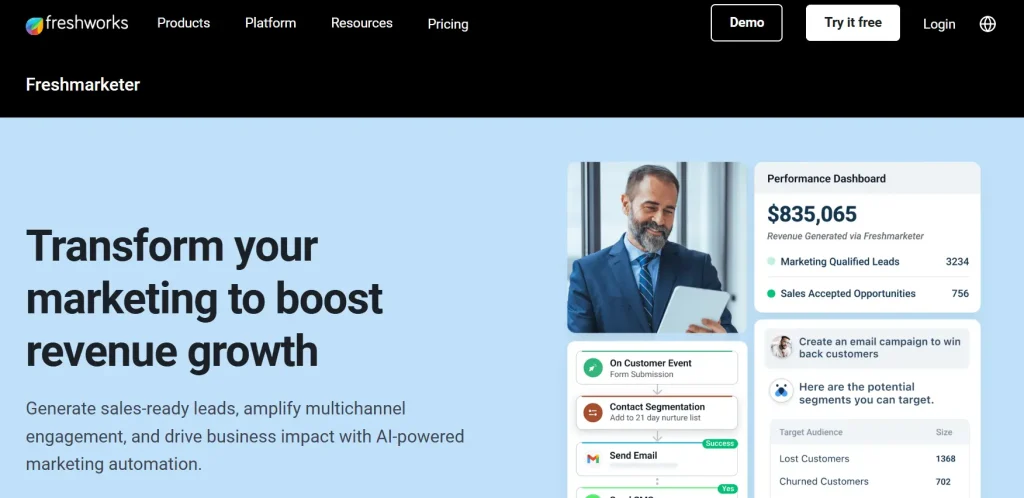
Freshmarketer is an intuitive tool designed to streamline marketing automation and customer engagement across multiple channels.
Main Features:
- Email Campaigns: Create and manage personalized email marketing campaigns effortlessly.
- Marketing Automation: Automate workflows to enhance customer interactions and conversions.
- Conversion Rate Optimization: Tools to analyze and boost website performance.
- CRM Integration: Seamlessly connect with Freshworks CRM for unified customer data management.
Pros:
- Easy-to-use interface with a visual automation builder.
- Strong focus on customer journey optimization.
- Integration with Freshworks products provides a cohesive ecosystem.
Cons:
- Limited features compared to some larger platforms.
- The learning curve for advanced functionalities may require additional effort.
Pricing:
- Free trial for 21 days to explore different features and plans.
- Paid plans start at $11 per month, with pricing based on the chosen features and scale. Find detailed pricing information here. But it really depends on the functionality you need, as there are more than 8 different pricing plans.
Who Is Freshmarketer Suited For?
Freshmarketer is ideal for businesses aiming to enhance marketing efficiency through automation and customer journey mapping. It suits companies already utilizing Freshworks products, providing an integrated approach to customer engagement.
11. Tidio
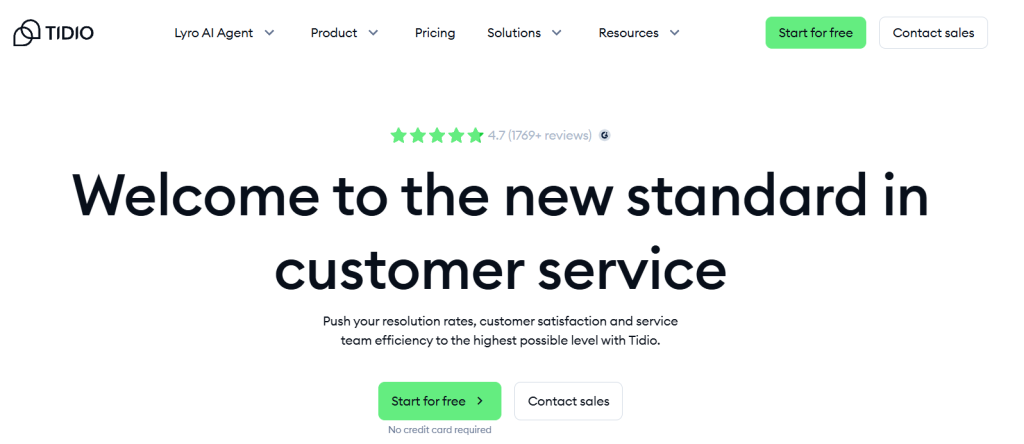
Tidio focuses on delivering seamless customer communication through its integrated omni channel platform.
Main Features:
- Live Chat: Engage website visitors in real time with customizable chat options.
- Chatbots: Automate responses and interactions to enhance customer service.
- Email Integration: Manage email communication directly within Tidio.
- Multichannel Support: Connect with customers via chat, email, and Messenger.
Pros:
- Easy setup and intuitive interface suitable for all user levels.
- Effective chatbot functionality that enhances customer support.
- Free plan available for small teams and startups.
Cons:
- Advanced features could lack depth compared to larger platforms.
- Limited integrations outside standard e-commerce platforms.
Pricing:
- Free plan available with up to 50 billable conversations and basic features.
- Paid plans start at $59 per month, varying with additional features and user requirements. Explore comprehensive pricing here.
Who Is Tidio Suited For?
Tidio is perfect for small businesses and startups focusing on improving customer communication. It’s particularly beneficial for those seeking an easy-to-use platform with live chat and chatbot capabilities to enhance customer experience.
12. JivoChat
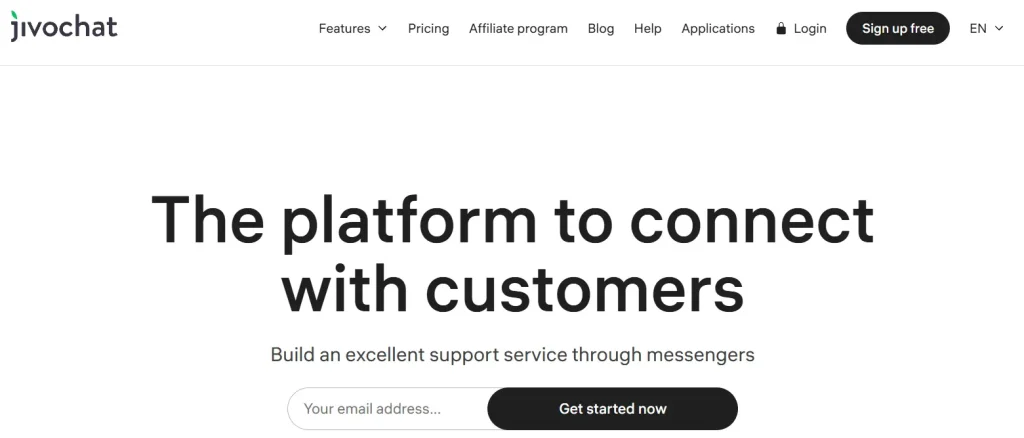
JivoChat is a versatile tool that enhances customer communication through efficient omnichannel support.
Main Features:
- Live Chat: Real-time engagement with website visitors for improved customer interaction.
- Multichannel Communication: Connect with customers through chat, phone, email, and social platforms.
- CRM Integration: Seamlessly manage customer data within the chat interface.
- Chatbots: Automate responses to streamline customer support processes.
Pros:
- Wide-reaching multichannel capabilities that expand customer engagement.
- User-friendly interface designed for quick deployment.
- Free plan available for teams starting with customer communication tools.
Cons:
- Some advanced features may require additional setup time.
- Limited advanced analytics compared to larger platforms.
Pricing:
- Free plan available, ideal for small teams.
- Paid plans start at $28 per agent/per month (if billed annually), adjusting based on features and scale. Detailed pricing can be found here.
Who Is JivoChat Suited For?
JivoChat is ideal for businesses aiming to improve customer service through efficient and straightforward communication tools. It suits companies looking for a multichannel approach to engage customers in real time.
Honorable Mentions & Emerging Solutions
As omnichannel marketing takes center stage, several tools are leading the charge in delivering integrated and seamless customer experiences. Here are some notable mentions and emerging solutions:
Iterable
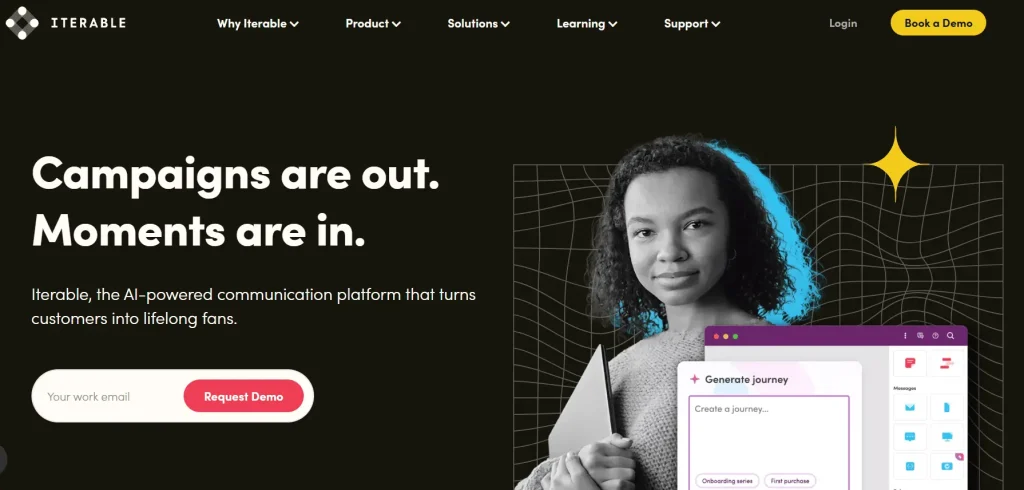
Iterable is a growth marketing platform designed for cross-channel engagement. It allows brands to create personalized experiences based on user interactions across email, mobile, social, and more. Iterable’s robust automation and customization capabilities make it a favorite among marketers aiming to enhance customer journeys.
MoEngage
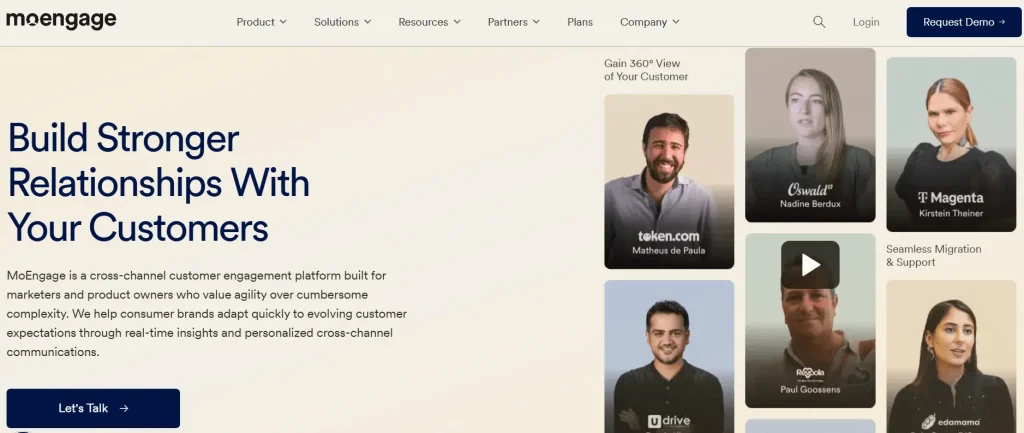
MoEngage focuses on customer analytics and marketing automation for a truly unified experience. With its AI-driven insights, marketers can understand customer behavior and deliver personalized content. MoEngage excels in real-time engagement and personalized messaging across multiple touchpoints.
Insider
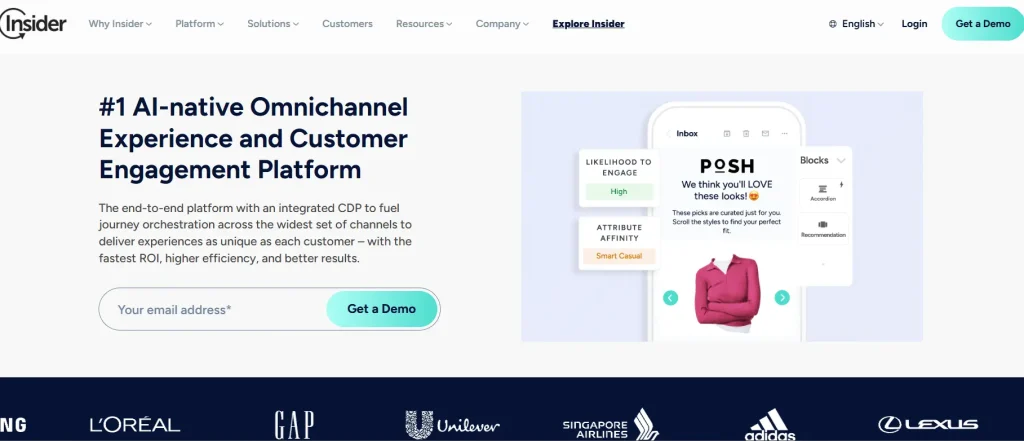
Insider combines AI and machine learning to offer predictive insights and personalized experiences. This platform is particularly strong in web personalization and customer segmentation, ensuring that brands can deliver the right message at the right time, enhancing conversion rates and customer satisfaction.
Customer.io
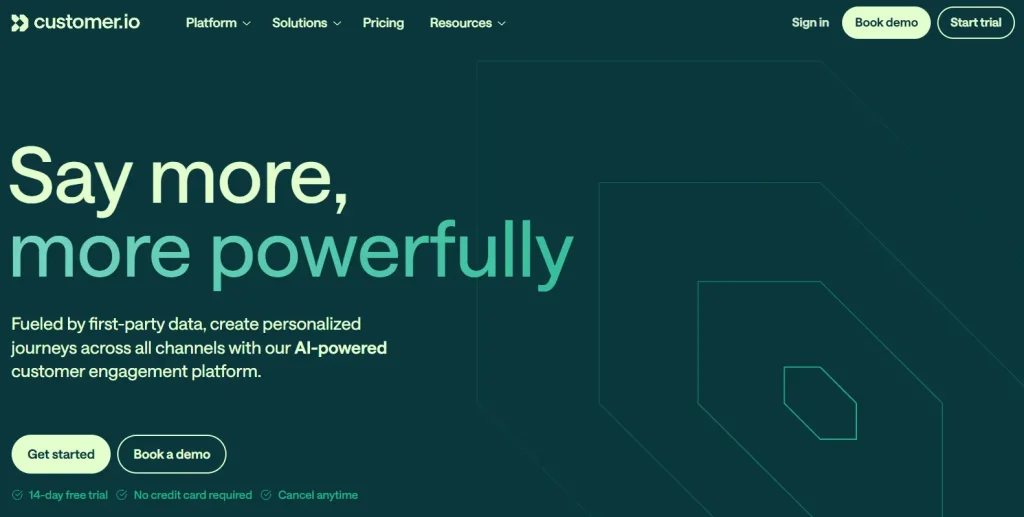
Customer.io empowers marketers to send targeted and automated messages to customers. With its flexible API and powerful segmentation, it allows for personalized communication across email, push notifications, SMS, and more. This precision helps brands nurture and retain their audience effectively.
User.com
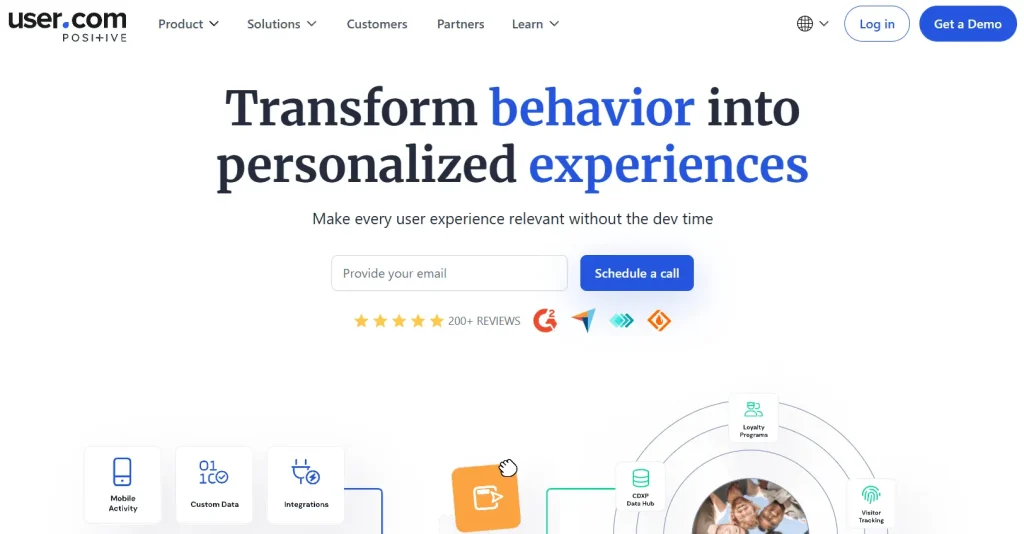
User.com offers a comprehensive suite for customer communication and marketing automation. Its platform includes tools for email marketing, live chat, CRM, and analytics, providing a seamless omnichannel experience. User.com is particularly adept at managing customer data to foster personalized interactions.
These solutions stand out by empowering businesses to create cohesive and engaging experiences across multiple channels, driving growth and improving customer loyalty.
Why Deliverability & List Hygiene Matter
Deliverability and list hygiene are critical components of successful marketing efforts. Invalid emails don’t just lead to bounces; they can disrupt multiple marketing channels. When bad data lurks in your email list, it clogs up SMS, push notifications, and CRM omnichannel systems. This inefficiency impacts automations and customer support, leading to unnecessary costs and time wastage.
A poor sender reputation can also lead to your domain being blacklisted across various platforms. This can cripple your marketing efforts, reducing visibility and engagement significantly.
Solution
This is where Mailerio comes in. By cleaning your email lists before syncing or running campaigns on any omnichannel marketing software, you can avoid these pitfalls. Using Mailerio for validation typically reduces bounce rates to around 2% and boosts inbox deliverability to 98-99%. This improvement drastically reduces wasted sends and enhances overall campaign performance.
With cleaner lists, you’ll see higher open rates, better engagement, and an improved ROI. More importantly, your sender reputation will remain strong, ensuring your messages consistently reach your audience. Using Mailerio isn’t just about avoiding problems it’s about optimizing your entire marketing strategy.
Make Sure Your Emails Land in Inbox!
Validate Email Lists To Protect Your Sender Reputation
How to Choose and Integrate Your Omnichannel Stack
Selecting the right omnichannel stack can make or break your marketing strategy. There are several considerations you should think about:
- Business Size: Smaller businesses might need an agile, cost-effective solution, while larger enterprises require more robust features.
- Technical Resources: Assess your team’s capability. Do you need user-friendly platforms, or can you manage complex integrations?
- Main Channels: Identify the key channels your audience engages with, like web, email, SMS, or social media.
- Integration Needs: Ensure your new tools can communicate seamlessly with existing systems like your CRM or e-commerce platform.
- Budget: Balance your budget with the features and scalability your business demands.
Before you bring data into any platform, make sure your email lists are clean. Using Mailerio for validation is crucial. Validate through real-time API or batch upload before importing to your stack.
- Export Email List: Get your list from your CRM, sales, or marketing tool.
- Set up a real-time email validation API so data gets automatically validated natively in your workflow.
- Use Mailerio for Validation: Upload or connect directly for thorough validation.
- Import the Cleaned List: Bring your cleaned data back to your omnichannel solution provider.
Why validate? Real-time validation can cut down invalid signups by 90%. Platforms like Shopify benefit from ensuring only genuine leads make it to your CRM, as seen in our user case studies. This not only maintains the integrity of your data but also enhances engagement rates, ultimately boosting your ROI.
Quick-Start Checklist for Omnichannel Readiness
Creating an effective omnichannel marketing strategy can feel like a daunting task, but breaking it down into manageable steps makes it more achievable. Here’s a quick-start checklist to get you moving in the right direction:
- Identify Primary Customer Channels
Start by understanding where your customers spend most of their time. Are they more active on social media, or do they prefer email updates? Knowing this helps you focus your efforts where they will have the biggest impact. Your primary goal is to map your customer journey to understand what truly drives results. As the customer purchasing journey can be complex, consider the Gartner B2B buying journey. How on earth can you create an omnichannel marketing strategy if you don’t understand your customer?

- Shortlist Omnichannel Marketing Tools/Platforms
Research and select tools that align with your strategy. Look for platforms that offer seamless integration across channels, whether it’s email, SMS, web, or in-store systems.
- Validate and Clean Your Contact Lists
Ensure your message reaches the right people by cleaning your contact lists. Using Mailerio helps you validate email addresses, reducing bounces and ensuring your communications reach their intended recipients.
- Map Automation/Journey Flows for Each Channel
Design customer journeys that make the most of each channel. Plan out how communications and interactions should flow based on customer actions and preferences to create a seamless experience.
- Sync Data and Test for Workflow/Trigger Accuracy
Accurate data synchronization is crucial. Test everything to ensure workflows and triggers function correctly across all channels. This prevents any hiccups that could disrupt the customer experience.
- Monitor Sender Reputation and Engagement Analytics
Keep an eye on your sender reputation and engagement metrics. After cleaning your lists with Mailerio, bounces typically fall below industry thresholds, maximizing your inbox placement rates. Monitoring these metrics helps you maintain a healthy sender reputation.
- Iterate Based on Performance Results
Finally, analyze the performance of your omnichannel efforts. Look at what’s working and what needs improvement. Use this data to refine your strategies and drive better results over time.
By following this checklist, you’ll be on your way to creating an effective omnichannel marketing automation strategy that aligns with your business goals and enhances customer engagement.
Expert Tips for Omnichannel Success
To truly thrive in omnichannel marketing, there are some essential practices you need to adopt. These not only safeguard your campaigns but also enhance their effectiveness.
Never Skip Email List Validation
Before launching any workflow automations, ensure you validate your email list. Sending emails to invalid addresses can harm your sender reputation and deliverability. By using a reliable email validation tool, you can filter out inactive or incorrect emails, ensuring your messages reach real users. Just take a look at Ajelix co-founder’s story on how their SaaS got almost broken due to high bounce rates and how their transactional emails didn’t even land in the inbox.
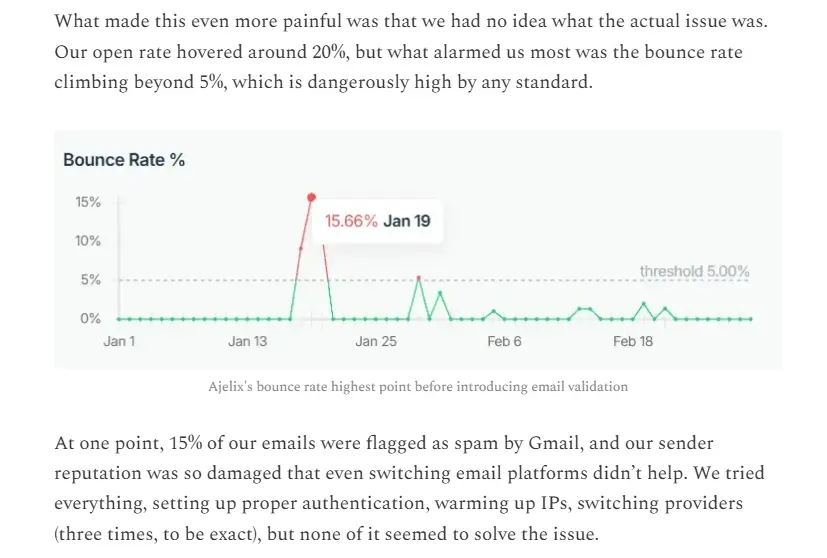
Don’t treat your contact validations as “nice to have,” it’s a critical part of your business, and you should keep an eye on.
Protect Your Sender Reputation With Mailerio!
Sign Up & Get 100 Credits Upon Registration
Re-validate Lists Quarterly
It’s crucial to keep your email lists clean over time. Re-validate them quarterly or whenever you plan a major campaign. This proactive approach prevents bounces, reduces spam complaints, and maximizes your campaign efficiency.
Leverage Mailerio API
Enhance your onboarding process by integrating the Mailerio API for real-time email protection on sign-up forms. Some businesses have reported open rate increases of 3X with real-time validation. This ensures that subscribers enter valid emails, improving engagement from the start.
Cross-check Sender Scores Monthly
Don t overlook the importance of monitoring your sender score. Cross-check it monthly across all channels to maintain a strong reputation. A high sender score increases the likelihood your emails will land in inboxes rather than spam folders, ensuring your messages are seen.
Following these expert tips will not only protect your marketing efforts but also boost their overall effectiveness, contributing to your omnichannel success.
FAQs
An omnichannel marketing platform is a tool that integrates multiple customer touchpoints into a unified strategy. It allows businesses to deliver a consistent experience across channels like email, social media, SMS, and in-store interactions.
Unlike multichannel tools, which often operate independently, omnichannel tools provide an integrated approach. This ensures that customer interactions are seamless and connected across all channels, leading to better engagement and higher ROI.
Bad data, such as outdated or incorrect email addresses, can significantly harm deliverability. It leads to higher bounce rates, damages sender reputation, and ultimately reduces the effectiveness of campaigns.
Top omnichannel marketing tools offer seamless integration capabilities. They can connect with various customer data platforms and CRMs to ensure a fluid data flow and synchronized customer interactions.
Look for software that provides strong integration capabilities, user-friendly interfaces, and robust analytics. Features like real-time tracking, personalized customer journeys, and flexible automation rules are crucial for maximizing the impact of your campaigns.
Conclusion
Omnichannel marketing focuses on unified, data-driven customer engagement. It s about creating a seamless experience across all touchpoints, ensuring your message is consistent and effective.
The right tool stack is essential for achieving this. Integrating vigilant email list validation through Mailerio ensures your campaigns reach real people. This helps maintain a high sender reputation and keeps your business off blocklists.
Don’t risk your ROI. Taking small steps like cleaning your lists with Mailerio can enhance all your omnichannel efforts, ensuring both efficiency and success.
